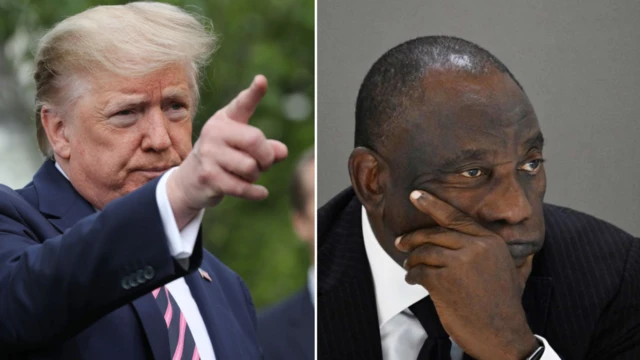The relationship between South Africa and the United States is at a crossroads, marked by increasing diplomatic and economic tensions.
The recent executive order by U.S. President Donald Trump to cut financial assistance to South Africa, coupled with the looming threat of removing the country’s preferential trade status under the African Growth and Opportunity Act (AGOA), has placed significant strain on bilateral ties.
At the heart of these tensions are South Africa’s land reform policies and its firm stance on Israel, both of which have drawn sharp criticism from Washington.
In an interview with the Vaultz News, Benjamin Ankrah explained that these developments could force South Africa to reconsider its foreign policy approach, particularly regarding its positioning between the U.S. and its strategic allies in BRICS.
“A meaningful deal between Ramaphosa and Trump could lead to a recalibration of South Africa’s stance on contentious issues like land reform and its vocal support for Palestine. However, this would likely require concessions, such as softening its position on Israel or reassessing the depth of its engagements with China and Russia.”
Benjamin Ankrah
Despite President Cyril Ramaphosa’s expressed willingness to negotiate with Washington, tensions remain high. The U.S. views South Africa’s policies as increasingly aligned with adversarial powers, prompting concerns over Pretoria’s commitment to Western partnerships. Ankrah noted that a protracted diplomatic fallout could have significant economic consequences.
“If tensions escalate further, Washington might move to revoke AGOA benefits entirely. This would deal a substantial blow to South Africa’s economy, limiting access to U.S. markets and impacting key industries reliant on exports.”
Benjamin Ankrah
He warned that the ramifications of such a move could extend beyond trade, potentially leading to a reduction in diplomatic engagement and a cooling of U.S. investment in the country.
South Africa has long championed a non-aligned foreign policy, balancing its relationships with Western powers and emerging global actors. However, Ankrah argued that Pretoria’s deepening economic and diplomatic ties with China and Russia may make this neutrality increasingly difficult to maintain.
“South Africa’s growing reliance on China for infrastructure investment and its defense cooperation with Russia signal a gradual pivot away from the West. This shift may be seen in Washington as an implicit alignment with U.S. adversaries, leading to further diplomatic friction.”
Benjamin Ankrah
The ideological underpinnings of South Africa’s foreign policy also play a crucial role in shaping its international positioning. Its “support for Palestine is deeply rooted in its own history of oppression” during the apartheid regime have influenced its stance on global justice issues. This was evident in its support for the International Court of Justice (ICJ) case against Israel, a move that has widened the rift with Washington.
“The ANC government has long framed the Palestinian cause as a parallel to South Africa’s own liberation struggle. This position, however, is in direct conflict with U.S. foreign policy, which views such actions as hostile to American interests and its close alliance with Israel.”
Benjamin Ankrah
While Pretoria defends its stance as a matter of principle, the political and economic costs of its position are becoming increasingly apparent. Washington’s response suggests that South Africa’s diplomatic choices are now being scrutinized more closely, with potential repercussions on future cooperation.

The BRICS Factor in U.S.-South Africa Relations
The BRICS alliance presents both opportunities and challenges for South Africa in its dealings with the U.S. As a member of the bloc alongside China, Russia, India, and Brazil, South Africa benefits from collective bargaining power in global trade and economic discussions. However, its close association with nations that often challenge U.S. hegemony complicates its negotiations with Washington.
“Being part of BRICS strengthens South Africa’s global standing and provides alternative economic partnerships. However, the U.S. perceives BRICS as a counterweight to its influence, which could limit South Africa’s ability to secure favorable trade and security agreements with Washington.”
Benjamin Ankrah
As South Africa seeks to navigate this delicate geopolitical terrain, the path forward remains uncertain. While Ramaphosa has signaled a willingness to engage with Washington, the core issues driving the tensions — land reform, trade preferences, and ideological differences — are unlikely to be resolved easily. Ankrah said, “The challenge for South Africa is to assert its sovereignty without alienating key economic partners.”
“The U.S. remains a crucial trading partner, and completely severing ties would not be in South Africa’s best interest. However, Pretoria must also balance this relationship with its commitments to its Global South allies and its strategic priorities within BRICS.”
Benjamin Ankrah
As such, in an increasingly polarized global landscape, Pretoria’s diplomatic agility with the U.S. will be tested as it seeks to maintain its economic stability while upholding its political principles.
READ ALSO: National Economic Dialogue Demands Urgent Reforms to Transform Ghana’s Economy



















